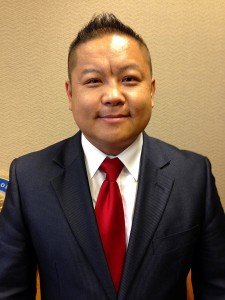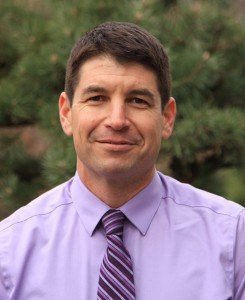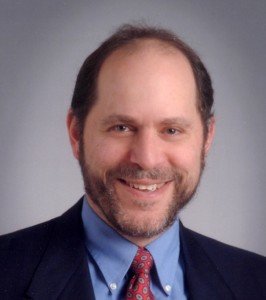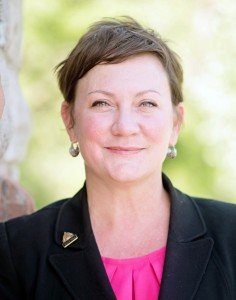By JAN WILLMS
The upcoming election Nov. 3 for city council will offer some competitive races in Wards 1, 4 and 5. Incumbents were asked by the Monitor what their greatest accomplishments were, and new candidates were asked why they chose to run. All candidates were asked about the greatest challenges facing the council, what issues they would like to work on, any specific problems in their Wards and their thoughts about the extended use of parking meters in St. Paul. All who had filed as candidates were contacted.
Mohamed Said is reportedly running as a write-in candidate for Ward 1 and had not filed. Trahern Crews, also a candidate for Ward 1, did not respond by the deadline for this article.
 DAI THAO was elected two years ago to complete the term of Melvin Carter III, who resigned as a Ward 1 council member to take a job in state education. Thao became the first Hmong-American elected to the St. Paul City Council.
DAI THAO was elected two years ago to complete the term of Melvin Carter III, who resigned as a Ward 1 council member to take a job in state education. Thao became the first Hmong-American elected to the St. Paul City Council.
Thao, 40, lives in the Frogtown neighborhood and is an IT manager for the Greater Minneapolis Crisis Nursery.
“In my two years, I’m proud to have focused legislation on social justice, affordable housing, road and pedestrian safety, and parks and green spaces,” Thao said. “We formalized a Sister City agreement between our city and the city of Djibouti, approved Paid Parental Leave, secured pool vouchers for low-income youth and supported the Women’s Economic Security Act, ensuring all women contractors are paid the same as men.”
Thao said he also increased local efforts to support women and minority-owned businesses, declared Indigenous People’s Day, passed Responsible Banking Ordinance and limited the tobacco industry from targeting youth with the Single Cigar ordinance.
Thao said he supported police body-worn cameras to strengthen community relations, passed the citywide bike plan and supported the implementation projects within Ward 1. He worked on completing sidewalk projects, supported community gardens and farmer’s markets on city-owned lots, brought in over $12 million to rehab, maintain and create affordable single family and multi-family housing. Thao said he got more green space on Griggs, Little Mekong Plaza, Rondo Commemorative Plaza and helped complete Frogtown Parks and Farms.
“Our challenges are all so interconnected that we need to work across our differences and see that even though we have different histories, we share a common destiny,” Thao explained. “We need access to good paying jobs and affordable housing. We need to create safe and vibrant neighborhoods and commercial districts, all of which connect all of us to doing better together,”
Thao said there remained a lot of work to do to create a strong tax base to meet the demand of city services. “We need to maintain a good mixed housing stock of market rate, senior and affordable housing to prevent gentrification,” he said.
Implementing racial equity tools into city policy and budget, making city services more accessible and streamlined, creating jobs for youth and positive after-school programs for kids are also areas
Thao would like to work on if re-elected. He would like to see better use of city resources and dollars, an increase in the minimum wage and earned sick and safe time.
Thao said specific problems of concern in Ward 1 are jobs and economic development, equity and education, public safety, and affordable housing.
“I am undecided on the expansion of parking meters in business corridors and commercial districts,” Thao said. “I do think that the parking policy in downtown needs to be flexible and adaptive to the current demand.”
 In Ward 4, RUSS STARK, 42, who lives in the Hamline Midway area and is the City Council president, is running for re-election.
In Ward 4, RUSS STARK, 42, who lives in the Hamline Midway area and is the City Council president, is running for re-election.
Stark cites numerous accomplishments during his time in office. He ensured the Green Line included high-quality streetscape, that businesses were supported during construction, and that walkable, mixed-income and mixed-use urban environments are created around the stations. He worked to maintain high-quality services despite flat or shrinking budgets, including preventing the closure of Hamline-Midway Library and restoring weeknight library hours.
Stark authored the City’s Complete Streets Policy and sponsored the City’s Green Building Policy and the Urban Agriculture Amendments to City Zoning.
“I championed the City’s new Bicycle Plan and the creation of the 8/80 Vitality Initiative and insisted on the inclusion of affordable units in housing developments seeking the use of Tax Increment Financing,” Stark stated. Other accomplishments were creating the Como Regional Park Advisory Committee, sponsoring the Student Housing Overlay Zone and supporting improvements to major streets in Ward 4 to make them more pedestrian and bicycle friendly.
Addressing challenges facing the City Council, Stark said, “We need consistent, long-term financing sources for the maintenance of our aging infrastructure. We need to continue to innovate to tackle racial disparities in St. Paul. We need to keep making our city more sustainable, and we have to keep investing in our commercial corridors to attract and create new job and business opportunities and new housing options.”
Stark said he would like to see the continued momentum of the success of the Green Line with additional planning and investments in new transitways. “The Riverview Corridor connecting the airport and the Mall of America to downtown St. Paul is a top priority among many transitways being planned,” Stark added.
Stark added that he would like to focus more resources on reducing racial disparities in the community and continue progress toward improvements to the city’s solid waste systems.
Regarding Ward 4, Stark sees a continuous need to strengthen and improve relationships between the large institutions and the neighborhoods that surround them, including the University of St. Thomas, Hamline University and Como Park.
“Just outside the Ward, we must focus attention on the redevelopment of the Snelling ‘Bus Barn’ site, whether or not the proposed MLS Soccer Stadium is built,” Stark explained. He said the Green Line, while improving livability in many ways, has made it more difficult for semi-trucks to navigate around the community. “We need to focus resources on creating new truck routes that will minimize their use of residential streets,” he added.
Stark considers parking meters as a tool to better manage parking and maximize the benefits of a major public asset—the space in our streets. “The expanded hours for meters in downtown St. Paul are sensible to encourage turnover of parking for businesses that rely on short-term parking being available. Parking meters may also make sense in some neighborhood commercial districts where parking demand is very high, such as Grand Ave. and the Selby/Western area,” Stark stated.
 The other candidate in Ward 4 is TOM GOLDSTEIN, 58, a lawyer by training who lives in the Hamline-Midway neighborhood.
The other candidate in Ward 4 is TOM GOLDSTEIN, 58, a lawyer by training who lives in the Hamline-Midway neighborhood.
Goldstein said there were a number of things that spurred his decision to run for the Council. “During light rail construction, the city and our council member did little to prevent the project from harming existing businesses along University Ave.—and the minimal funding that was appropriated to cover business losses came too late and with too many strings attached to make it effective,” Goldstein said. “Meanwhile, the city seems to have no shortage of funds when it comes to subsidizing downtown condo projects or stadiums. In recent months, my opponent has voted to award Comcast a no-bid contract to manage the city’s internal Internet network while doing nothing to leverage customer service improvements for the public or address the digital divide; sponsored a resolution to reduce parkland/green space requirements for developers and been unwilling to aggressively oppose teardowns that have negatively impacted several blocks in Ward 4.”
“Imagine where we could be as a city if we focused on sustainable development practices, realized the potential in our parks, lakes and riverfront amenities, and repaired our long-neglected infrastructure.”
“We need an advocate in Ward 4 who will put people before politics and leaders who will insist on accountability and transparency rather than pay lip service to citizen concerns. That’s why I’m running for City Council,” Goldstein explained.
Regarding challenges to be addressed, Goldstein said the most recent data gathered by the Wilder Foundation shows St. Paul has a poverty rate of 24%, with 67,000 individuals living below the poverty line, including 25,000 children.
He said the quickest way to build wealth and prosperity in a community is through job creation. “Instead of figuring out how we’re going to create the thousands of livable wage jobs we need to grow our tax base and help lift people out of poverty, our City Council remains fixated on tax subsidies and corporate giveaways that only serve to increase the burden on everyone else.”
Goldstein said that if St. Paul is going to compete in the 21st century, the city needs a bold, sustainable vision that includes greater educational opportunities; multiple affordable housing options; proper maintenance of roads, bridges and sewer system; expanded recreational amenities and green space and investments in the kind of technological innovations that will attract the companies and entrepreneurs creating the high-paying jobs of tomorrow.
For St. Paul to thrive, Goldstein said the opportunities for entrepreneurs and startups to succeed must dramatically improve. He suggests starting an Office of Enterprise Development that encourages businesses to locate to St. Paul, identifies barriers in making that happen, and provides technical assistance to new ventures.
“As part of that effort, we need to explore ways to make affordable, universal, high-speed Internet a reality for everyone in St. Paul,” Goldstein noted. “We also need to extend the livable wage ordinance to all St. Paul employers with exemptions for small businesses and start-ups,” Goldstein said he would push to leverage city resources that maximize educational outcomes for children, primarily by encouraging businesses and nonprofits to partner with local schools and provide adult mentors. He added that there is a need for fairer tax policies and changes in the zoning code that will stop senseless teardowns and curtail the growing boom in ‘McMansions.’
To achieve these goals, Goldstein emphasizes the need for complete transparency in local government. “I will advocate for the hiring of an independent City Auditor who would regularly evaluate city programs and departments for their effectiveness so that we can have an honest appraisal of how the city is performing from one year to the next,” he said. He added that the city must also take care of neighborhood amenities.
Goldstein cites the pursuit of a soccer stadium on the old Bus Barn site is of particular concern in Ward 4. “St. Paul just completed building a new ballpark for the Saints that involved nearly $7 million of public funding, handed all the stadium revenues to the team for a mere $2.5 million up-front investment, and now the city is faced with a $10 million deficit this budget cycle,” Goldstein said.
He suggested that a tech hub for the medical device industry, a St. Paul equivalent of the Midtown Global Market or a version of The Shops at West End entertainment complex in St. Louis Park would be a better choice for the Midway.
“Additionally, we have a golden opportunity in Ward 4 to address the digital divide in our community by piloting an all-fiber network along Snelling Ave. or as part of the Green Line along University Ave.,” Goldstein noted.
He said that as a former business owner on Grand Ave., he is particularly concerned that expanding parking meters is more about raising city revenues than addressing a specific problem.
“If there are areas in the city where parking is clearly a problem, utilizing parking districts or other means to ensure turnover of parking spaces may be appropriate,” Goldstein said. “But moving forward on a proposal without seeking feedback from taxpayers is exactly the kind of practice that I would work to stop as a council member.”
 AMY BRENDMOEN, 45, is the incumbent council member in Ward 5, covering Como, the North End, Payne-Phalen and Railroad Island.
AMY BRENDMOEN, 45, is the incumbent council member in Ward 5, covering Como, the North End, Payne-Phalen and Railroad Island.
She said that she has been very accessible to the community by having bi-monthly community office hours, authentic involvement in her diverse neighborhoods, taking “Lake Laps’ with constituents, managing an active and responsive social media presence, and having a very high-quality Ward 5 staff.
“Community members have led the way and helped shape projects 30 years in the making. We have also been able to create immediate change, sometimes in the span of a business day,” she said. “On a weekly basis, someone takes the time to tell me that they feel heard. And that’s a pretty cool thing.”
Brendmoen said that in partnership with the community, she was able to facilitate a long overdue district council boundary change. “I helped increase services and programming at the Como Lakeside Pavilion, not to mention 79 new jobs,” she said. “We will see 12 new single-family homes on a city-owned land on Maryland Ave. that will bring new homeowners and investment in the North End. I helped to ensure the preservation of the affordable senior housing building ‘Como by the Lake’, and I directed resources to create a plan to reignite the oft-overlooked Railroad Island neighborhood. I followed up by delivering significant funds to begin the execution of said plan.”
Brendmoen said that as the chair of the Housing and Redevelopment Authority, she has worked well with her fellow council members to stabilize home prices in many neighborhoods through targeted investments.
According to Brendmoen, St. Paul is on the right track. She said it is crucial that the city continue rebuilding all that was lost during nearly a decade of recession. “This means ensuring our city workforce is fully restored, and overdue maintenance projects are re-prioritized,” she stated. “It means addressing the stark inequity seen from one neighborhood to the next so that all may share in the fruits of our recovery.”
Brendmoen said the greatest challenge St. Paul faces is its wholly inadequate state funding under Local Government Aid, and the absence of a meaningful state transportation funding plan that recognizes the responsibility of the State to equitably fund heavily utilized inner city street and bridge infrastructure.
“Compounding the State not holding up its end of the deal, St. Paul also has 1/3 of its parcels off of the tax rolls due to the large number of churches, parks, schools, hospitals, nonprofits, government buildings and private colleges as the state’s capitol city. Balancing the very real need for maintenance investment against important new projects critically timed to draw in both retiree and millennial residents is incredibly challenging,” Brendmoen explained.
Brendmoen said that an underlying and deep concern of hers remains the method in which city services are delivered. “So much of our work is driven by complaints made directly by residents,” she stated. “This approach can be very effective for people and neighborhoods that actively report problems, concerns or suspicious activity. But in areas where neighbors are struggling just managing their own daily lives or where residents may not speak English as their first language, I can see a visible difference in how that area is served.”
A more organized, intentional system of scheduled service-delivery would help provide balance and equity in how services are delivered across the city and Ward 5, Brendmoen believes.
She said Ward 5 still needs more jobs and economic development dollars. “We have a ready workforce ready for action,” she said. “In addition, we need housing that is affordable, dignified and adding value to our community.”
Brendmoen said she would like to continue livability work in St. Paul by continuing to support multi-modal transportation projects and the development of beautiful parks and neighborhood amenities that make public spaces attractive for residents and employers.
“St. Paul has made significant investments in the downtown core, and there is so much action in our city,” Brendmoen said. “It is thrilling to visit downtown in the evening these days. The parking study took a long look at our downtown parking. I believe the recommendation to expand parking meter times and rates was thoughtful, and I support that change. I am also glad that our new technology allows us to adjust meters as appropriate.”
 DAVID GLASS is a business owner whose office is in the North End neighborhood and whose home is in the Como area. He and his wife Pam are former 3Mers and were co-owners of Black Bear Crossings since 1996.
DAVID GLASS is a business owner whose office is in the North End neighborhood and whose home is in the Como area. He and his wife Pam are former 3Mers and were co-owners of Black Bear Crossings since 1996.
Glass is running for Ward 5 council member, and he is endorsed by the Minnesota Young DFL, Saint Paul Indians in Action and the St. Paul Police Federation. “I’m told this is the first time the police have pulled its endorsement from an incumbent and given it to the challenger,” he said.
He is active on numerous nonprofit boards, including Minnesota Housing Partnership, Ain Dah Ung Center, National Coalition Against Racism in Sports and Media and the American Indian Chamber of Commerce.
Glass said he chose to run because he is concerned with cost overruns on the Green Line rail project and CHS stadium project, the lack of commitment to economic development on the East Side and North End, struggles for absentee housing, support of recreation centers and libraries and effective implementation of community policing.
“I am committed to honesty, open transparency, good business ethics, better city services and better neighborhoods,” he said. “I’ve seen a pattern of decision-making by our current city council member that has ignored neighborhood interests and good management practices.”
Glass said the greatest challenge to the city council is to put neighborhoods first.
“Walk with me on Front St., Wheelock Pkwy,, Dale St., Rice St. and Edgerton,” he commented. “Most of the neighbors I have talked to who live on these streets or have businesses have not been engaged during the past three years.”
He said decisions about bike lanes, parking meters, community policing, recreation center programming, relationships with schools, neighborhood housing and street maintenance are all helped by effective neighborhood interaction.
Glass said, if elected, he would like to be a good neighborhood liaison on issues like problem drug houses, unrepaired roads, traffic hazards, safety hazards, new business start-ups and noise issues.
“I would publicize our budget and budget changes, so that the neighborhood can see where our spending priorities really are,” he noted. “I would use my city council vote and influence to ensure that the basics like safety, street repair, more plowing and recreation centers are funded first.”
Glass stated he would identify a real business plan to fix the city’s infrastructure, starting with streets, and understand how amenities are added where they make sense.
“I would ensure that our city government is transparent and accountable,” he said. “Currently we find out about decisions made if the news or print media decide to report on them, if they even get the information.” Hes said meetings on Wednesday afternoons at 2:30pm are closed to public discourse, and consent agendas hide important issues affecting our communities and neighborhoods.
Glass said he would find ways to develop an effective housing plan for St. Paul. “Foreclosed houses should be going into homeownership programs through the city partnering with many nonprofit groups,” Glass said. “The current city council person could be doing much more to encourage home ownership instead of just selling homes into the rental market.”
Glass claimed he would promote the diverse ethnic, cultural events of Ward 5 and all of St. Paul. He would also reach out to local media and the neighborhood through a Ward 5 newsletter that fully covers relevant neighborhood issues.
Regarding specific concerns in Ward 5, Glass said that while areas like Grand Ave., 7th St., Selby and Payne avenues are experiencing a renaissance and renewed prosperity due to efforts by their local city council people, Rice St., Dale St. and Maryland Ave. have been neglected for years. “Our current Ward 5 city council person has spent over a million dollars to add a bar to our previously family-friendly Como Lake while other areas have been ignored,” Glass stated.
He said that as a city council person he will bring the economic development and business knowledge, skills and commitment to bring renewal and prosperity to Rice, Dale, Maryland and all of Ward 5.
Glass said he would be a strong advocate for community policing. “My already active good relationship with local police resulted in the endorsement by the St. Paul Police,” he added.
“Neighbors throughout Ward 5 are telling me that the city has left them out of decision-making and communication loops on removing trees, installing bike lanes, new assessments, expensive art projects, changing zoning rules and more,” Glass said. “The absence of our current city council person at doors, district council meetings and events has been noted. I intend to be very active and present in the neighborhood.”
Glass expressed concern about the rec centers, stating there is not enough rec equipment. “Our Sylvan and Front Rec Centers were torn down and replaced with restrooms,” he said. “The warm-up rooms, gyms, indoor activities and supportive, caring adults are all gone. Our rec centers need to be people-staffed centers with activities, not just a few fields.”
Glass explained that advocating for neighborhoods has to go beyond city hall. “We need an active city council person who will also advocate at the state and city level as well,” he said. “Active advocacy goes even further. Railroad safety has become a significant neighborhood issue.” Glass stressed that railroads are running longer trains of 100 cars, running contents of crude oil through neighborhoods, running during all hours of the day and night.
“We should be holding neighborhood meetings not to alarm neighbors but to remind them of what we should do if there is an accident and advocate for additional safety measures,” Glass said.
“Budgeting new parking fees for many neighborhoods that previously have not had parking fees without neighborhood input is one more example of why we need a new city council member in Ward 5,” Glass said. “Neighborhoods should be first in budget spending priorities, not the first to be tapped for more funds. Parking fees would provide another reason for people to go to free-parking malls instead of local businesses.”
 DAVID JAMES SULLIVAN-NIGHTENGALE, 41, has been a safety engineer for almost 15 years after having served in the US Army. He lives in the North End neighborhood and is the other candidate from Ward 5.
DAVID JAMES SULLIVAN-NIGHTENGALE, 41, has been a safety engineer for almost 15 years after having served in the US Army. He lives in the North End neighborhood and is the other candidate from Ward 5.
“Safety issues in my neighborhood and within the city have gone unmitigated for years,” he said. “As a safety professional I can contribute best as a council member.”
Sullivan-Nightengale said, “We are the least represented of the citizens of Minnesota’s biggest cities, about one council member for every 42,000 citizens. We need to increase the number of elected representatives to reflect our diversity,” he said. “We need affordable housing with good paying and stable jobs. We need to run the city like successful and responsible large businesses including best practices such as kaizen, lean, and quality and safety management systems to provide our citizens with on-time and on-budget products and services.”
Sullivan-Nightengale said the issues he would most like to work on if elected are those involving safety, design of infrastructure and quality of services.
Regarding Ward 5, he sees specific concerns as being public education, traffic safety, street maintenance and affordable housing. “These are just a few of the things my neighbors are really fired up about,” Sullivan-Nightengale noted. “We also have the high hazard trains coming through areas within Ward 5 that could kill many people if there was a derailment and fire.”
Sullivan-Nightengale said he would expect expansion of parking meters more in a downtown where you have to pay for parking anyway, rather than on Grand Ave.
“I don’t want to turn St. Paul into Minneapolis, where you have to pay to park just to go for a walk in the park or shop at local businesses,” Sullivan-Nightengale said. “I saw more people enjoying Minneapolis parks before the meters. We don’t want to discourage people from shopping at our small businesses.”
Comments
No comments on this item Please log in to comment by clicking here